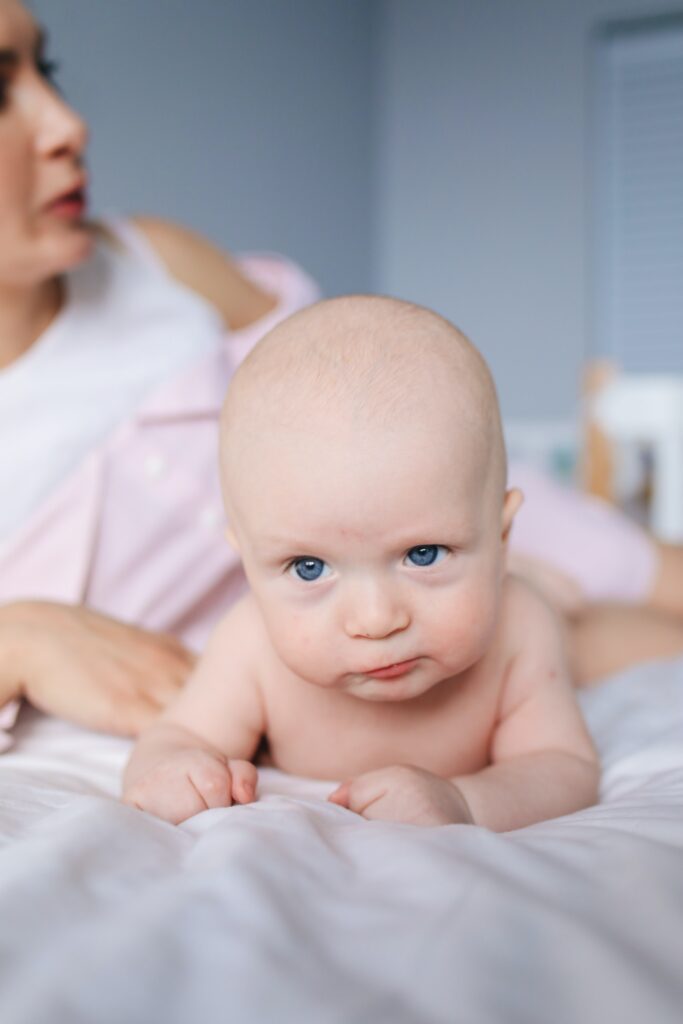Influenza, more commonly known as the flu, is a terrible thing to have. As parents, we often do our best to prevent flu in our babies and children. It is more common during certain seasons and can have some complications of its own.
What is The Flu

Influenza, or flu for short, is a virus that may cause serious illness. Flu is more than just a runny nose and a sore throat. It is extremely important to protect babies and young children from the flu as it can make them very very sick. In rare cases, flu may cause death. In 2017, the flu had caused a record number of deaths amongst children. Most of the children who died had not received a flu vaccine.
How Does The Flu Spread
The flu can easily spread from person to person. When someone who has flu coughs, sneezes or speaks, the virus will spread through the air. Your baby may get infected with the flu if they breathe the virus in or if they touch something, such as a toy, that has been contaminated with the flu virus. Flu enters through the nose, eyes and mouth.
If a person has the flu they are able to infect others from 1 day before they begin to show symptoms up to 5 to 7 days after. Those who are very sick with the flu, or young children, may be able to spread the flu for longer, especially if symptoms are still present.
Is a Flu Vaccine Required Every Year

In short, yes. The Centers for Disease Control and Prevention, better known as the CDC as well as the American Academy of Pediatrics (AAP) recommends that everyone 6 months and older get the flu vaccine each year. It is especially important for children that are younger than 5 to get vaccinated as they are more likely than older children to have serious health problems caused by flu. The flu can be a danger for all children, even children who are in good health.
The best way you can protect your child from the flu is to ensure that they receive their flu vaccine each year before flu season which is October through to May. Your child is more likely to get flu during flu season, although flu can present itself any time of year.
There are two available methods for administering the flu vaccine to children:
Flu Shot: Children that are 6 months and older can get the flu shot.
Flu Nasal Spray: This is a spray that your child’s doctor will put in your child’s nose. Children who are 2 years or older are eligible for the flu nasal spray. It is, however, not recommended for children who have certain health conditions, such as asthma, heart and lung problems, as well as a weak immune system that does not do much to protect them from infections. The flu nasal spray is not recommended for children who take certain medicines for a long time, such as aspirin.
The first time that your baby receives the flu vaccine, they will get two doses to ensure that they have the best protection from the flu. Afterwards, your child will get one dose of the vaccine each year.
The flu vaccine is safe for most children to take, even for babies who were born prematurely (before 37 weeks of pregnancy). In the event that your child has had a bad reaction to the flu vaccine in the past, discuss it with his doctor. The doctor may want to monitor your child closely after getting their vaccine to check for any kind of reaction. If your child has an egg allergy, it is best to consult with his doctor in order to decide if he is eligible for the flu vaccine. Some flu vaccines contain eggs.
There are a variety of flu viruses that are always changing. A new flu vaccine is made each year to protect against three or four flu viruses most likely to infect individuals during the upcoming flu season. If your baby has received the vaccine, protection from the flu lasts up to a year, therefore it is important for your child to be vaccinated each year. The vaccine is available from his doctor, or from other places such as pharmacies that offer it.
Are Children More at Risk for Serious Health Problems Caused by Flu?
Babies and children that are younger than 5 years old, especially children younger than two years old, are more likely to have complications from the flu than older children. Babies that are premature are at an increased risk of serious complications from the flu as well.
It is recommended by the CDC that babies get most of the vaccines, including the flu vaccine, according to their chronological age. The chronological age is determined from birth. Even in the event of a baby being born small, or with a low birthweight, they can get vaccinated at the same time as other babies who are the same age.
In the event that you have a premature baby, talk to your baby’s doctor to ensure that your baby receives the flu vaccine on time. Children that have been diagnosed with chronic health conditions, such as asthma, heart disease or blood disorders, are at a high risk of flu complications.
The Health Problems That Flu Can Cause in Children

Complications of flu in children younger than 5 years:
- Worsening chronic health conditions such as asthma or heart disease.
- Brain problems such as encephalopathy. Encephalopathy is any disease of the brain that affects the brain’s structure or how it works.
- Dehydration, this means that you don’t have enough water in your body.
- Pneumonia which is an infection in one or both lungs.
- Sinus problems and ear infections. Sinuses are the hollow air spaces that can be found within the bones around the nose. Sinus infections may happen when fluid builds up within the sinuses.
- Death. Although it’s rare, flu complications may lead to death.
Signs and Symptoms of Flu in Your Baby

The signs of the condition will be easily noticeable, for example a rash or coughing. The symptoms are things that your baby might feel, but that aren’t easy to see, such as having a sore throat or feeling dizzy. If your baby presents any of these signs or symptoms of the flu, call their doctor right away or take them to see the doctor as soon as possible.
- Being overly tired or sleepy, this is also known as fatigue.
- Coughing
- A fever of 100°F or above, chills or body shakes. Not all babies that have the flu present a fever.
- Headache, or muscle or body aches.
- A runny or stuffy nose.
- A sore throat.
- Vomiting or diarrhea.
The flu is known to come on quickly. Fever as well as most other signs and symptoms may last a week or longer. Although your baby can’t tell you how they’re feeling, babies who have the flu are often sicker, fussier and seem more uncomfortable and unhappy than babies who have a common cold. If you suspect your baby has the flu, even if they have received their flu vaccine, it is best to call the doctor.
If your baby shows any of the following signs or symptoms, take them to the emergency room immediately:
- Being extremely fussy to the extent that they do not want to be held.
- Bluish color on the lips or face.
- Chronic health conditions such as asthma get worse.
- Fast breathing, trouble breathing, chest pain or ribs pulling inward with each breath.
- A fever in a baby that is younger than 12 weeks old, fever above 104°F in babies that are older, or children. Or if they have a fever with a rash.
- Fever or cough that gets better but then returns and worsens.
- If the baby is having seizures. A seizure is when the whole body, or certain parts of the body move without control.
- Not taking in enough fluids or not having as many wet diapers as they usually do. If your baby does not wet a diaper for 8 hours, has a dry mouth or has no tears when crying, they may be dehydrated.
- Not waking up or being alert or interacting with you when they are awake.
- Severe muscle pain. It may be so severe that your child is unable to walk.
- Vomiting that is severe or does not stop.
How is Flu Treated in Babies and Children
Your baby’s doctor may prescribe an antiviral medicine in order to prevent or treat the flu. An antiviral is a medicine that kills the infections that viruses cause. Antivirals can make a baby’s flu milder as well as assist your baby in feeling better faster. Antivirals may also help prevent serious flu complications, such as a lung infection known as pneumonia. For flu, antivirals work best if they are used within 2 days of showing signs or symptoms.
In a Nutshell
Babies younger than 6 months who present with flu symptoms should be taken to their doctor immediately. If someone is sick, ensure that they do not come into contact with your baby. Washing and cleaning toys regularly will ensure that the flu does not spread to your baby.

